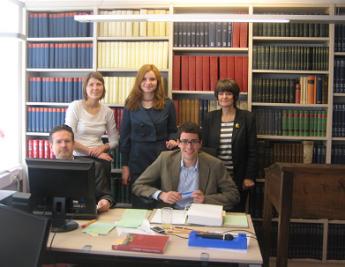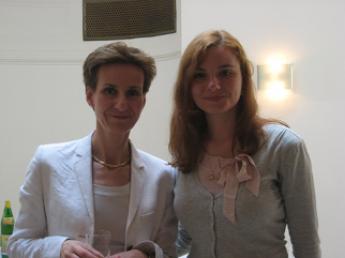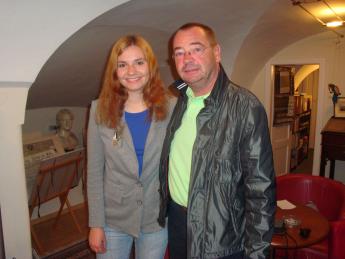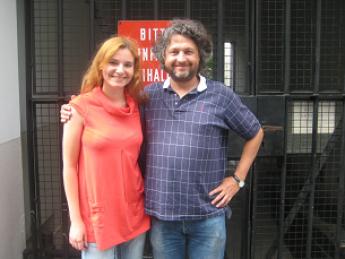ILAB Internship Program 2011 for Students of the Moscow State University of the Printing Arts II
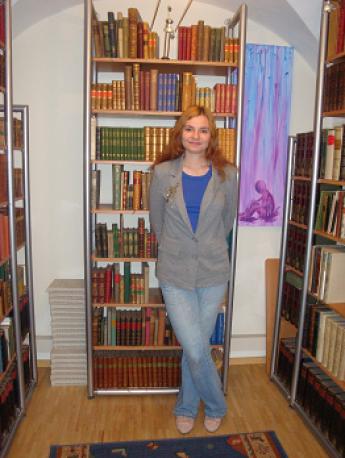
A Report by Anastasya Zhikhareva
I am Master of Books at the Moscow State University of Art Print and study the antiquarian book trade. My ILAB Internship lasted five weeks, and Norbert Donhofer played a great role in its organization. For the first time young students and rare booksellers were offered the opportunity to study the world’s rare book markets. Until then such possibilies were very scarce. Due to the fact that the history and the structure of the antiquarian book trade differ from country to country learning experiences in various countries are very useful. International experience will teach us how to organize the antiquarian book trade in Russia more efficiently.
During my internship, I visited three very different countries - Austria, Germany and Hungary. Their histories are inextricably linked, but the forms and methods of the trade are different in each country. In Germany there are many auction houses, while Austria has more open bookshops. However, with the development of the Internet online trading has become increasingly important everywhere. In Hungary, there are mostly second-hand bookshops with an additional stock of rare and antiquarian books. Each store organizes auctions. This is very important for the Hungarian dealers to attract new customers.
My internship began in Germany, in Munich. For two weeks I worked, and actively assisted, at the auction house Zisska, Schauer & Co where the 57th auction took place from 4 to 6 May. I learned about the German auction houses and their history. I was told about the Internet, and I participated in the pre-auction activities featuring lots of visitors and prospective bidders. In May, many auctions are held in Germany, attended by many collectors and dealers, mainly from Europe. Customers at Zisska, Schauer & Co. came from France, Britain, and Austria. Bibliophiles from Italy participated as telephone bidders. There was also a call from Moscow from the auction house "Alexander", which deals with coins, numismatics, gold coins and old Russian ephemera. They were interested in a set of postcards with images of Russian tsars. To carry out such an ambitious global trade, you must be able to speak or at least to understand many languages. All employees know more than one language: English, French, Italian. To work with antiquarian books also requires the knowledge of Old High German, ancient Greek, and Latin. In Russia, we have auction houses since 1988. One of the first auctioneers was "Gelos”, now there are four major houses - "Gelos", "Alexander", "Empire," "The Cabinet". However, their activities are still only known to a small circle of collectors and bibliophiles, because the international market requires global experience. Much of what I learned at Zisska, Schauer & Co. was very useful for my future career.
I continued my training in Vienna where I spent the first week at the Austrian Association of Publishers and Booksellers. A congress was held at the National Library of Austria on May 13 with many prominent personalities of the Austrian book trade. I was present during the discussion as a spectator. Union Director Dr. Inge Kralupper pretty much told me about their activities. The following week was entirely devoted to the antiquarian book trade, while I stayed with the President of the Austrian Antiquarian Booksellers’ Association (VAO) Norbert Donhofer. Much attention was paid to graphic techniques such as etchings and lithographs. Norbert Donhofer explained the techniques and the history of art and showed examples from his huge collection of prints and lithographs.
I also got a very interesting lesson in book bindings, their characteristics and their production in different countries and through the centuries. Besides these theoretical aspects Norbert Donhofer introduced me to the specifics of the antiquarian book trade in Austria. I studied the wide range of books, autographs, prints, atlases and manuscripts offered by Norbert Donhofer Rare Books, I used the reference library, the database and got to know the most important international websites from the ILAB site to the sites of the national libraries worldwide. It was shortly before the London International Antiquarian Book Fair at Olympia, and Norbert Donhofer showed me how to prepare for such an important event: the choice of books, to make a catalogue, the packaging. I could observe the various forms and methods of antiquarian bookselling - via the Internet and by visitors who came to the bookshop in the centre of Vienna. Norbert Donhofer’s antiquarian bookshop is well organized and operates excellently. I really learned a lot from him.
I spent the last week of my internship in Hungary as a guest of the president of the Hungarian Antiquarian Booksellers’ Association (MAE) Adam B?sze. Rare music books and manuscripts are a very special field of interest and Adam B?sze is one of the most well-known specialists. He owns a large collection - music, scores, bibliographies, biographies of musicians, Hungarian music and musicians. During my stay in Budapest Adam Bösze held an auction. Unfortunately, there are not many collectors and bibliophiles in his field, so it was a small but fine auction in which more than 50 per cent of the lots were sold. After working at Zisska, Schauer & Co., Adam’s auction seemed to me well organized. It was announced in advance on the website and on the radio. In Hungary, many antiquarian bookshops regularly organize auctions. It is another way to attract the attention of buyers. Adam B?sze also taught me how to use the bibliographies and to determine the publication date of musical notes. This was very important for me, because at home I am working in the music library named after M. Balakirev. For my work and expanding horizons in the field of music editions, this practice of working with Adam was very helpful.
All in all, the internship was a very unique experience. For five weeks I saw a large number of professionals who shared their knowledge with me. I visited three different countries. I had the chance to learn new aspects of the antiquarian book trade, to compare and to draw the necessary conclusions. I express my huge gratitude to everyone who participated in the program - primarily Norbert Donhofer, Herbert Schauer, Adam B?sze, Eric Waschke, Alisa Semina, Olga Tarakanova, Tatiana Panarina. I express my great appreciation and say thank you very much.
Read the reports by
>>> Alena Lavrenova
